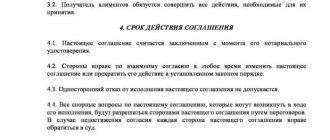Norms of the Civil Code of the Russian Federation governing transaction procedures
From the point of view of the legislation of the Russian Federation, the agreement of the parties on the payment of alimony is a type of civil law contract and is regulated not only by the norms of family law, but also by the provisions of the Civil Code of the Russian Federation.
Read more: Claim for the recovery of alimony in a fixed amount of money
According to civil law, an agreement is concluded for the purpose of completing a particular transaction, and the law literally interprets a transaction as the performance by citizens of any actions that have certain legal consequences for the parties to such a transaction.
Thus, Article 420 of the Civil Code of the Russian Federation establishes that an agreement between the parties on the approval of their rights and obligations is, in accordance with the law, a contract, and, therefore, the decision of the parties to enter into an agreement and pay or receive alimony on its basis directly falls into the category of contractual relations. It is important that the legislator gives the parties to the agreement freedom to choose its terms and conditions (Article 421 of the Civil Code of the Russian Federation), thus, these provisions of the law also apply to the agreement on the payment of alimony. However, Article 422 of the Civil Code of the Russian Federation indicates that the provisions of the contract should not conflict with other provisions of the law.
Thus, the agreement on the payment of alimony should not contradict the norms of Family Law on the procedure for concluding and executing such an agreement.
Since the Family Code classifies an agreement on the payment of alimony as a voluntary contractual relationship, former spouses or even married persons can enter into it on a voluntary basis. This is possible, for example, if the child is already eighteen years old and one of the parents wants to pay child support to help get an education.
The husband does not pay alimony, which is established in court
If your ex-husband does not pay alimony, which is established in court, then you need to contact the bailiff service with a corresponding application. The bailiff service can and should apply appropriate measures to the debtor aimed at bringing him to justice. Responsibility may be administrative or criminal. The possibility of bringing a defaulter to criminal liability is associated with the concept of malicious evasion of alimony payments.
Malicious evasion of alimony
Let's figure it out with you, what is malicious evasion of alimony payments ?
Malicious evasion of alimony payment is a systematic failure to fulfill the obligation to support a child .
In order for evasion to pay alimony to be considered malicious, there must be a court decision on the collection of alimony or a notarial agreement on the payment of alimony.
Evasion from paying alimony will be considered malicious if, in order to evade paying alimony, the defaulter commits some of the following actions:
- change your place of residence very often;
- hiding from bailiffs;
- deliberately hides or understates his income;
- evades payment of alimony without good reason;
- has a large alimony debt;
- is wanted;
- received a warning from the bailiff about criminal liability and does not comply with the requirement to pay the debt.
Criminal liability for non-payment of alimony
In accordance with Article 157 of the Criminal Code of the Russian Federation, criminal liability is provided specifically for malicious evasion of payment of alimony for minor children. The sanction of the article provides for up to 1 year of imprisonment.
The procedure for executing an agreement to pay alimony
The main principles of legislation regulating the procedure for implementing the provisions of an agreement on the payment of alimony are contained in Chapter 22 of the Civil Code of the Russian Federation. The provisions of the Family Code of the Russian Federation reveal more precisely the procedure for executing an agreement on the payment of alimony.
If we proceed from the basic provisions of the Civil Code, then the agreement on the payment of alimony, like any other agreement, must be executed properly (Article 309-310 of the Civil Code of the Russian Federation). In the text of the article, proper execution means literal adherence to all the points and conditions of the concluded agreement regarding the amount of alimony, the frequency of its payment, as well as the procedure for resolving other issues directly related to the concluded agreement.
Read more: Can the amount of a legal penalty be changed?
Also, the agreement may establish one or another jurisdiction to resolve possible disputes between the parties in court. Consequently, if such a condition exists, the claim for termination of the agreement will be filed in the judicial district, the jurisdiction of which is determined in the agreement.
However, it is worth keeping in mind that in the process of carrying out actions to execute the agreement, many provisions of the Civil Code governing the relations of the parties to the agreement cannot be applied to the agreement on the payment of alimony.
For example, the Civil Code allows a party to a contract to make a decision on unilateral refusal of the contract, indicating the grounds for such refusal. Most often, one party to a contract, if there are grounds for termination, sends a statement to the other party with a request to consider the contract terminated.
Procedure
A party whose marital or financial situation has changed may approach the other party with a proposal to terminate the agreement. This can be done orally or in writing . The written form makes it possible to confirm that the other party has received the offer in the event of litigation.
If the other party agrees to terminate the contract, a written agreement to this effect is drawn up (either independently or with the involvement of a lawyer) , which is signed by the parties and certified by a notary. Without notarization, the termination agreement is considered invalid, and the alimony payment agreement is considered valid in its previous version.
If a refusal is received in response to a proposal to terminate or a response is not given within a reasonable time (usually 30 calendar days), you should file a claim in court . The claim shall indicate information about the agreement (date and its terms), the changed position and claims, and attach supporting documents. Significant changes can be confirmed by :
- medical certificate of health;
- MSEC conclusion;
- extract from the medical history;
- pensioner's ID;
- a copy of the work book;
- certificate of registration as unemployed;
- copies of marriage and birth certificates;
- income certificate and other documents.
In addition, a copy of the agreement itself and evidence of the other party’s disagreement with termination (a written refusal or notification of delivery of a letter with a proposal to terminate the contract) is provided. As a rule, when the court decides the issue of terminating the alimony agreement, the issue of collecting alimony in the future, taking into account newly developed circumstances, is simultaneously resolved.
Procedure for terminating an agreement to pay alimony
The norms of the Family Code, in turn, prohibit the parties from unilaterally waiving alimony obligations (Part 3 of Article 101 of the Family Code of the Russian Federation), despite this possibility established by Chapter 29 of the Civil Code of the Russian Federation, which regulates the procedure for terminating civil contracts.
As a rule, the following grounds are required to terminate an alimony agreement:
- Non-fulfillment or improper fulfillment by a party to an agreement of its terms. The consequences of improper compliance with the terms of the contract and agreement for the payment of alimony also vary. For example, to resolve disagreements between the parties in the process of implementing an agreement, it is often necessary to draw up a statement of claim in court and resolve the dispute in court, while an agreement on the payment of alimony in the event of its non-fulfillment has the legal force of a writ of execution (Part 2 of Article 100 of the Family Code of the Russian Federation) .
- The parties decided to mutually terminate the agreement by sending each other a written statement to that effect.
- One of the parties filed a lawsuit demanding termination of the alimony agreement.
Thus, without going to court, termination or invalidation of the alimony agreement is possible only with the consent of both parties. Moreover, this fact must be certified by a notary.
If everything is not done in accordance with the law, then the alimony agreement may be invalidated.
A lawsuit requesting termination of an agreement can be filed either in connection with a significant change in the financial situation of a party to the agreement, or in connection with a failure to reach a compromise regarding the termination of the concluded agreement.
The basis for terminating the agreement may be that the financial situation of one of the parties has changed, or serious changes have occurred in its marital status.
Your husband doesn't pay alimony, but you haven't filed a lawsuit yet
If you and your husband have a verbal agreement to pay alimony, but this agreement is not fulfilled, then you need to go to court. You can do this yourself, or contact a lawyer or family lawyer .
If you manage to conclude an agreement on the payment of alimony in a notarial manner, this will simplify your task of resolving the issue of non-payment of alimony in the event that your husband evades paying alimony after concluding a notarial agreement.
You can threaten your husband that you will collect alimony for the previous three years. It is possible that such a prospect will bring some sense to the defaulter.
If you can’t come to an agreement voluntarily and your husband won’t make contact, then you have only one option – the courts !
You will need to file a statement of claim with the magistrate at the location of your spouse or your place of residence.
Alimony is awarded from the moment you apply to the court and can be collected for the previous three years.
Your husband does not pay alimony, but you have an agreement to pay alimony certified by a notary
The agreement on payment of alimony, as a rule, clearly states the terms, amount and procedure for paying alimony. Such an agreement is concluded in writing and notarized.
If your ex-husband evades paying alimony under a notarial agreement, then you need to contact the bailiff service.
In accordance with Art. 12 of the Federal Law “On Enforcement Proceedings”, notarized agreements on the payment of alimony or their notarized copies are executive documents and are subject to forced execution. In other words, the notarial agreement is subject to execution through enforcement proceedings.
How are they calculated?
Calculation of alimony from an unemployed spouse must be done very responsibly. First, go to court with a statement of claim. We advise you to help the court by collecting as much evidence as possible of the spouse’s possible income.
Sources of income can include any income, for example, from renting an apartment or a spouse's pension. In the vast majority of cases, even if the spouse does not have an official source of income, he works somewhere unofficially. Try to find out where he works, maybe you can talk to his director or employer.
In any case, after the writ of execution is issued, the bailiffs will also look for all possible sources of income.
The court may choose two options for payment:
- Payment in a clearly fixed monetary amount. This option is most often used for unemployed spouses. The amount of alimony in this case is calculated from the cost of living in this region. In most cases, it will be 5,000-10,000 rubles per child. In this case, the court will also take into account the marital status of the mother and child.
- The second option is to set a certain percentage of income. The sizes and calculations here differ depending on how many children you have. If one – then 25%, if two – 33.3%, if three or more, then 50%.
Remember also that alimony can also be collected from the mother if she is raising a child under three years old or a disabled child.






